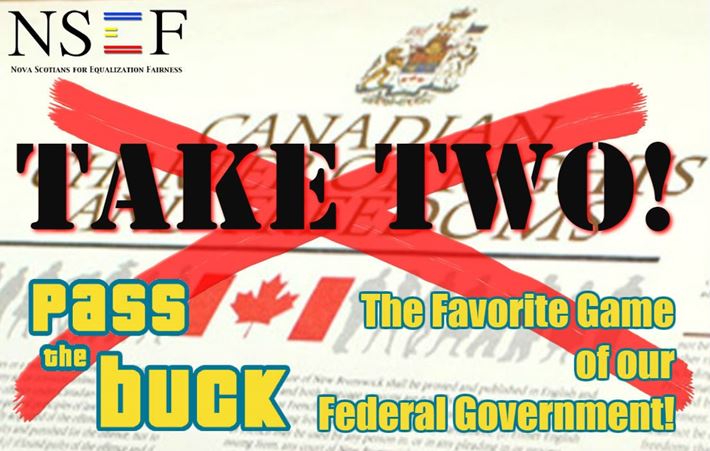Concerned citizen, Paul Patterson corresponds with the office of Bill Morneau. The following is Paul's first letter, the response from the Ministers office is attached in this post. The next letter is from Paul in response to that letter. Please read, share and comment.
From: Paul Patterson
Date: May 11, 2018
To: Canada Department of Finance [email protected]
Subject: Interpretation of "Unconditionality" of Equalization Transfers
Dear Folks:
I would very much appreciate your having someone with the appropriate legal expertise and Constitutional understanding to advise me on the correct interpretation of the meaning of the term "unconditional," as it applies to a province's spending of the federal Equalization Transfers that it receives from the government of Canada, and provide me with a citation to any legal authority for that correct interpretation.
A group to which I belong, Nova Scotians for Equalization Fairness has been attempting to persuade the Nova Scotia government that, even though they are interpreting the term "unconditional" to mean that the provincial government may spend the federal transfers in any way it wishes, and that there is no explicit requirement, or even any implicit expectation, that a portion of the funds be spent to reduce the existing large disparities between the level and quality of public services, and the level of tax rates, between different regions and municipalities of the province.
It has been our presumption that this "slush fund" interpretation is incorrect; and, that, in order to comply with the explicit Constitutional intent of Section 36.2, the expenditure of at least the ( ~ 26% ) Property Tax Fiscal Capacity amount of the Equalization Transfers must be directed to the municipalities whose deplorable level and quality of public services, extraordinarily high property tax rate, and continually increasing poverty the provincial government relies upon to maintain its entitlement to the greatest possible annual Equalization Transfers.
In a letter which I received, yesterday evening, from Karen Casey, Finance Minister of Nova Scotia, she states the following:
"Federal equalization transfers are not distributed. No region or municipal unit is given a specific allotment of the federal equalization funding. The funds flow into the general revenue fund of the province. Government uses the general revenue fund to provide a wide range of programs and services to the people of Nova Scotia, including Cape Breton. For example, hospitals, health care, schools, universities, roads, highways, libraries, museums, community services, and provincial parks."
Every explanation we receive from elected and bureaucratic officials of the province, relies upon the justification for not applying the Eqaulization Transfers to equalization within the province is justified by the argument that the transfers are "unconditional."
If the province's expansive interpretation of "unconditional" means that it is under no legal or moral obligation or expectation to apply any of the federal Equalization Transfers guaranteed by the constitution to alleviating the grotesque public service and tax rate disparities between, for example, the Cape Breton Regional Municipality and the Halifax Regional Municipality, then why should the residents of Ontario, Alberta and British Columbia continue to have their money used for developing and enriching Halifax, at their expense, and to the ongoing demographic and economic hollowing out - and dissolution - of communities throughout non-metropolitan regions of the province.
Is there any legal authority for the proposition that the Nova Scotia government is under no obligation or expectation to use any of the Equalization Transfers it receives from the Canadian government "to provide reasonably comparable levels of public services at reasonably comparable levels of taxation" to residents across the province?
If, rather, the Nova Scotia government is, in fact, required to comply with the Constitutional purpose and intent for which the Equalization Transfers are provided, is there some narrower interpretation of the term "unconditional" for which it may be held accountable?
Thank you for your kind assistance in enabling us to address this question.
Sincerely,
Paul Patterson, Ph.D.
Syncom Strategic Planning Consultants
(formerly, Chair in the Management of Technological Change,
Cape Breton University, ret.'d)
Co-author of The Loom of Change; Weaving a New Economy on Cape Breton Island (2003)
Sydney Forks, Cape Breton
- Please see the attached response letter from Bill Morneau's Office, located at the bottom of this post. See "Pictures and Documents"
- For review, please see the Federal-Provincial Fiscal Arrangements Act-7.8 attached.
From: Paul Patterson
Date: Wed, Jul 18, 2018
Subject: Attention: Allie Chalke; re Unconditionality of Equalization Transfers
To: [email protected]
Thank you for your letter of 18 July, 2018, in response to my inquiry of 11 May, 2018, concerning the government of the Nova Scotia government's diversion of Federal Equalization Transfers to purposes unrelated to public services and tax rates.
We very much appreciate the time and effort you put into researching and preparing your reply. Indeed, it was helpful in clarifying for us that the Federal Equalization transfers are part of a federal program which is entirely separate from Nova Scotia government's program for the distribution of grants in lieu of taxes to local communities, which it has, for two decades, been confusingly identifying as "equalization."
Your letter also removed any ambiguity in the meaning of "unconditional," in the context of equalization transfers . Your department is giving the word the broadest possible interpretation, which is consistent with the Nova Scotia government's assertion.
However, your letter, while referring to several considerations related to my original inquiry, did not provide a citation to, or information about, any constitutionally-valid, legal authority for the proposition that a province has an "unconditional" license to spend the Federal Equalization Transfer payments that it receives in any way it pleases, without contravening the intent of Article 36 of the Constitution Act,.
The purpose of those Equalization Transfers, as stated in 36(1), is:
- ( a) promoting equal opportunities for the
By its very terms, then, Article 36 intends the transfers to provide these benefits to individual Canadians, not to provincial governments.
As stated in 36(2), the Federal Equalization Payments are made to a provincial government [in trust for its residents], so that it will be able to provide the Canadians who reside in its various communities with reasonably comparable levels of public services, at reasonably comparable levels of taxation - not, as is now the case, so that the provincial government can use those payments, without accountability, in any way it pleases - in particular, as a political slush fund to subsidize private corporations, urban real estate developers and special interests pork barrel projects, to escalate the salaries and pensions of MLA's and bureaucratic executives, and to favour one privileged community at the expense of all others, in order to garner campaign contributions and votes.
I have reviewed the Federal -Provincial Fiscal Arrangements Act to which you referred in your letter and, although I might have missed it, I could find no reference in Section 7 which could be interpreted as legal authority for granting a province an "unconditional" license to divert 100% of the Federal Equalization Payments that it receives to activities unrelated to equalization; that is, to reasonably comparable levels of public services and local taxes among communities across the province.
Significantly, local property taxes are not listed in Section 7 among the specific provincial revenue sources to be taken into consideration, in determining the Federal Equalization Transfer to a province.
Yet, in fact, local property taxes are considered, as the municipal fiscal capacity component of the transfers. Their omission from Section 7 implies that at least the municipal fiscal capacity component which is now included in the constitutionally-mandated, Federal Equalization Transfers payments (approximately 26%, for Nova Scotia), should be applied to the equalization of public services and property taxes for municipalities within the province - not simply to equalize the entire the province's fiscal capacity, as a whole, to a level comparable to the average of other provinces across the nation.
Members of Nova Scotians for Equalization Fairness, the group of which I am a member, question the constitutional, as well as ethical, grounds for the government of Canada's allowing the government of Nova Scotia to perennially exploit the deepening economic and demographic crisis facing most of the communities outside the forcibly burgeoning Halifax capital region, in order to bolster the annual amount of Federal Equalization Transfers, while diverting all of those annual transfers to purposes unrelated to equalization.
I therefore respectfully repeat my request for information to which your department might be able to direct us, for any legal authority (not policy) which legitimizes the granting to a province of an unconditional license to spend Federal Transfer Funds in disregard of the Constitutional intent of Article 36.
Thank you for your kind assistance.
Sincerely,
N. Paul Patterson, Ph.D.
Syncom Strategic Planning Consultants
(formerly, Chair in the Management of Technological Change,
Cape Breton University, ret.'d)
Co-author of The Loom of Change; Weaving a New Economy on Cape Breton Island (2003)
Sydney Forks, Cape Breton






0
Log In or Sign Up to add a comment.- 1
arrow-eseek-eNo items to displayFacebook Comments